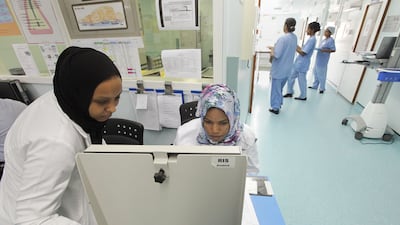DUBAI // Health chiefs will build three new medical colleges and five nursing schools in a 10-year drive to meet Dubai’s health needs.
The emirate will need 8,000 more beds, 7,323 more doctors and 8,510 nurses in the next decade, said Essa Al Maidoor, the director general of the Dubai Health Authority.
“The introduction of mandatory health insurance and the emirate’s urbanisation have created great opportunities for investment in the health sector to meet the growing demand for primary and specialised health services,” he said.
The three new colleges are in addition to the University of Sheikh Mohammed bin Rashid for Medicine and Health Sciences, which will receive its first batch of students in September 2015.
In tandem with the five new nursing schools there is a strategy to make the nursing profession more attractive.
The authority aims to increase nurses’ wages to make them competitive with other GCC and western countries, introduce more flexible shifts, work with the private sector to train nursing students in private hospitals and train nursing assistants in Dubai with a two-year diploma. There is a shortage of nurses in the emirate, and only a few are Emirati.
The authority also wants to attract and retain high-calibre medical and healthcare staff to fill gaps in certain specialities, such as anaesthesia. It will improve the residency programme and send Emirati physicians for postgraduate degrees in disciplines that are in short supply, to fill the gaps by 2025.
“We have looked at the need across 18 different health specialities until 2025. This data will help us cooperate with universities to ensure we have medical students studying these specialities,” said Salah Al Marri, the authority’s director of corporate excellence.
”Such data also prevents under-utilisation and over-utilisation, which is important for sustainability and optimum patient care.”
The Dubai Clinical Services Capacity Plan follows a study looking at geographical distribution of health services and doctors and where the shortfalls are.
Dr Al Maidoor said it showed a need for a large number of healthcare facilities in certain parts of the emirate, especially in Jebel Ali, Marina, Jumeirah Lakes Towers and the new Al Maktoum Airport area.
In contrast, there is an over-saturation of health services in areas such as Jumeirah.
“This means that we need to limit issuing new licences in these areas until the need arises again in the future,” said Dr Al Maidoor.
Mr Al Marri said it was the first in-depth study on clinical services capacity in the UAE and the wider GCC.
“The study is a Dubai-wide study and we have surveyed all healthcare facilities in Dubai including those of the Dubai Health Authority, the Dubai Healthcare City, the Ministry of Health, private sector and free zones health facilities in Dubai.
“For the study several important parameters were taken into consideration: Dubai’s health services, residential sectors, visitors that utilise Dubai’s health services, requirements of Expo 2020, requirements of Dubai Medical Tourism Strategy, and even the requirements of the increasing number of expatriates in the age group 60 years and above in Dubai.”
The plan would be reviewed and updated every two years, he said.
Mr Al Marri said it would be implemented in conjunction with the Dubai health master plan, announced in 2013, which includes a Dh3 billion revamp of Rashid Hospital, 40 new primary healthcare centres and three new hospitals.
jbell@thenational.ae

